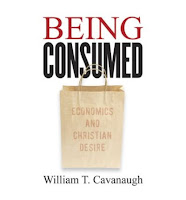Next, he turns his attention to consumerism. He doesn’t make the typical assumption that consumerism is essentially about greed, and argues instead that consumerism is an unhealthy detachment from production (we don’t make our own stuff), producers (generally the poor overseas), and products (our attachment to products is short-lived) which results in a continually restless spirit; mostly because possession kills desire. He uses the Eucharist as a model for healthy consumption which changes us into the body of Christ whereby we are consumed by the world around us and by God. Instead of consuming, we are consumed. Through it we find healthy attachment to God, but also to others; including production, producers, and products.
Cavanaugh considers globalization by examining the binary concepts of the global and the local. He defines Globalization as a sort of aesthetics produced by a particular kind of desire which fails to produce to unite human beings because it abstracts human relationship from their concrete embodiment in the particular and local (thus it is a sort of parody of catholicity). He makes a fascinating argument that Globalization appears to encourage diversity on the particular and local level. Yet it’s never ending drive to proliferate serves to allow the local and particular to actually be swallowed up in what he calls the “universal gaze.” There are profound and prolific differences, yet they do not matter as they all become swallowed up in the global or “universal gaze.” Drawing on Han Urs von Balthasar, Cavanaugh argues the Christian response involves Christ as the “concrete universal,” as local communities realize their universality in particular and local ways.
Finally he deals with the myth of scarcity by contrasting the assumptions of scarcity and abundance. His assessment of the myth of scarcity is based chiefly on the critique of the assumption that human desire is limitless, which results in a tragic view of the world. His solution is based in the Eucharist, which tells the story of abundance and life in God that beckons each person to call into question their way of life especially in regards to the poor. God’s abundance consumes us as the Eucharist proclaims that the heavenly feast is occurring now.
Cavanaugh has an incredible mind and he writes very well. This book is interestingly very short, yet densely packed with analysis, critique and imagination. I read this book, in part, because I am preaching about consumerism as a part of our advent celebrations in my church. I wanted to be informed by Cavanaugh’s critique. However, after reading it I’m forced to realize just how far away most of us are from his vision of humankind. Christian formation is always ongoing, but it seems – for most of my church at least – more formation would be required to read and understand this text. I’m inspired to keep chipping away at the assumptions of my congregation and to continually call into question our economic practices, especially in regards to the poor and the environment.













